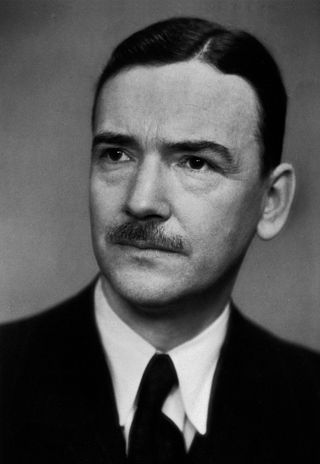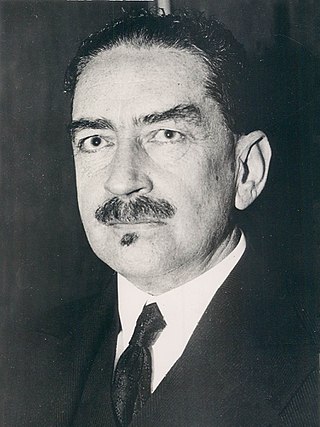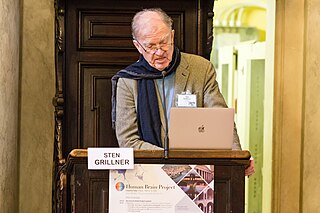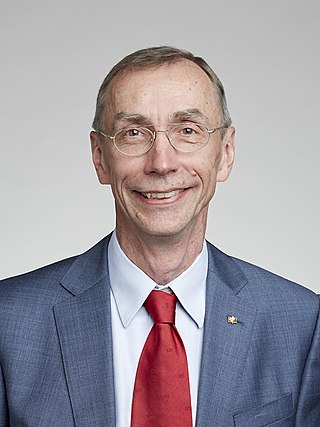
The Karolinska Institute is a research-led medical university in Solna within the Stockholm urban area of Sweden and one of the foremost medical research institutes globally. The Nobel Assembly at the Karolinska Institute awards the Nobel Prize in Physiology or Medicine. The assembly consists of fifty professors from various medical disciplines at the university. The current vice-chancellor of Karolinska Institute is Annika Östman Wernerson, who took office in March 2023.

Günter Blobel was a Silesian German and American biologist and 1999 Nobel Prize laureate in Physiology for the discovery that proteins have intrinsic signals that govern their transport and localization in the cell.

Ulf Svante von Euler was a Swedish physiologist and pharmacologist. He shared the Nobel Prize in Physiology or Medicine in 1970 for his work on neurotransmitters.

Hans Karl August Simon Euler-Chelpin, since 28 July 1884 von Euler-Chelpin, was a German-born Swedish biochemist. He won the Nobel Prize in Chemistry in 1929 with Arthur Harden for their investigations on the fermentation of sugar and enzymes. He was a professor of general and organic chemistry at Stockholm University (1906–1941) and the director of its Institute for organic-chemical research (1938–1948). Euler-Chelpin was distantly related to Leonhard Euler. He married chemist Astrid Cleve, the daughter of the Uppsala chemist Per Teodor Cleve. In 1970, their son Ulf von Euler, was awarded the Nobel Prize in Physiology or Medicine.

Torsten Nils Wiesel is a Swedish neurophysiologist. With David H. Hubel, he received the 1981 Nobel Prize in Physiology or Medicine, for their discoveries concerning information processing in the visual system; the prize was shared with Roger W. Sperry for his independent research on the cerebral hemispheres.

Göran Liljestrand, Swedish pharmacologist, known for the discovery of the Euler-Liljestrand mechanism.

A Nobel Committee is a working body responsible for most of the work involved in selecting Nobel Prize laureates. There are six awarding committees from four institutions, one for each Nobel Prize.

The Nobel Committee for Physics is the Nobel Committee responsible for proposing laureates for the Nobel Prize for Physics. The Nobel Committee for Physics is appointed by the Royal Swedish Academy of Sciences. It usually consists of Swedish professors of physics who are members of the Academy, although the Academy in principle could appoint anyone to the Committee.

Sten Grillner is a Swedish neurophysiologist and distinguished professor at the Karolinska Institute's Nobel Institute for Neurophysiology in Stockholm where he is the director of that institute. He is considered one of the world's foremost experts in the cellular bases of motor behaviour. His research is focused on understanding the cellular bases of motor behaviour; in particular, he has shown how neuronal circuits in the spine help control rhythmic movements, such as those needed for locomotion. He is the current secretary general of the International Brain Research Organization (IBRO) and president of the Federation of European Neuroscience Societies (FENS). For his work, in 2008 he was awarded the $1 million Kavli Prize for deciphering the basic mechanisms which govern the development and functioning of the networks of cells in the brain and spinal cord. This prize distinguish the recipient from the Nobel prizes in basic medical sciences.
Samfundet De Nio is a Swedish literary society founded on 14 February 1913 in Stockholm by a testamentary donation from writer Lotten von Kraemer. The society has nine members who are elected for life. Its purpose is to promote Swedish literature, peace and women's issues. It mainly presents a number of literary awards. It was started as an alternative to the Swedish Academy and is often compared to its more noted cousin.

The Nobel Committee for Chemistry is the Nobel Committee responsible for proposing laureates for the Nobel Prize in Chemistry. The Nobel Committee for Chemistry is appointed by the Royal Swedish Academy of Sciences. It usually consists of Swedish professors of chemistry who are members of the Academy, although the Academy in principle could appoint anyone to the Committee.
The Nobel Assembly at the Karolinska Institute is a body at Karolinska Institute that awards the Nobel Prize in Physiology or Medicine. It is headquartered in the Nobel Forum on the grounds of the Karolinska Institute campus. Originally the Nobel Assembly was not a formal body but rather the collective of all professors at Karolinska Institute. In 1977, the Nobel Assembly became a separate private organization hosted by Karolinska Institute. Until 1984, all Karolinska Institute professors belonged to the Assembly; since 1984, the membership has been restricted to 50 Karolinska Institute professors.

Göran K. Hansson, is a Swedish physician and scientist.

The Nobel Prize in Chemistry is awarded annually by the Royal Swedish Academy of Sciences to scientists in the various fields of chemistry. It is one of the five Nobel Prizes established by the will of Alfred Nobel in 1895, awarded for outstanding contributions in chemistry, physics, literature, peace, and physiology or medicine. This award is administered by the Nobel Foundation, and awarded by the Royal Swedish Academy of Sciences on proposal of the Nobel Committee for Chemistry which consists of five members elected by the Academy. The award is presented in Stockholm at an annual ceremony on 10 December, the anniversary of Nobel's death.

Robert Adolph Armand Tigerstedt was a Finnish-born medical scientist and physiologist who, with his student Per Bergman, discovered renin at the Karolinska Institute, Stockholm in 1898. Renin is a component of the renin–angiotensin system which regulates blood pressure, salt and water homeostasis and is an important therapeutic target. Tigerstedt is also recognised as an educator, author and social campaigner.
The Björkén Prize is a scientific award given by Uppsala University. It is awarded for outstanding research in science and the theoretical branches of medicine. The prize was established in 1893 from a donation given by university lecturer John Björkén (1833–1893). Björkén was a physician and medical assistant professor in surgery and obstetrics at Uppsala. The prize was first awarded in 1902 on the day of his death.

The 2022 Nobel Prize in Physiology or Medicine was awarded to the Swedish geneticist Svante Pääbo "for his research in the field of genomes of extinct hominins and human evolution". It was announced by Thomas Perlmann, secretary of the Nobel Assembly at Karolinska Institutet in Stockholm, Sweden, on 3 October 2022.














